When Did We Stop Believing That Truth and Character Matter in Elections?
- Terry Wigmore
- Nov 1, 2024
- 4 min read

I was originally intending this exercise to poke around the idea that some Christians, who may be sincerely devout in their faith, can also be sincerely duped when it comes time to engage in political discourse. However, to get at that issue, we need to acknowledge that for some believers, this is an issue of the separation of church and state, where faith (what you choose to believe as truth) has nothing at all to with, and there should be no overlap into, the world of politics. Politics is about the governance of the people of a country. Faith is about what people choose to believe and practice as their religion, and the generally accepted position is that the state should not make any rules regarding faith or the practice of faith. The problem is that faith flows into actions (individual conduct), and actions can be regulated by laws which is the domain of government and that is where things get murky. Christians must follow the same regulations as everyone else or you no longer have a democracy where the rule of agreed upon laws prevail. Faith is inherently political. (https://progressivechristianity.org/resource/politics-religion-you/)
The problem of faith -based decision making is best illustrated by contrasting the views of those who support the pro-life position on abortion, and those who advocate for a woman's right to choose what is her best course of action for her own body. It seems to me that those who support efforts to overturn Roe V Wade, for instance, really are the ones who want their religious beliefs to become the law of the land for everyone else. These are the people who are classic single-issue voters: those who have identified one issue as the one that most aligns with their belief. In the case of abortion, their belief is that the unborn fetus/child is entitled to the same protections under the law as is afforded any person. To abort a fetus is tantamount to murdering a child (which is what some claim the Democratic party supports and is doing even post-birth (see https://www.npr.org/2024/09/10/nx-s1-5107942/abortion-roe-wade-ivf-donald-trump-kamala-harris-debate-2024)
The problem in taking a position that is rooted in the religious belief that all life is sacred (i.e. comes from God), is that there is no room for exceptions. This is a real problem when the complexities pregnancy and maternal health are dismissed and considered of lesser moral value than the fetus. Pro-life, as I argued in a blog about defining terms (https://www.terrywigmore.com/post/clarity-defining-terms-to-see-what-they-really-mean) really means pro-fetal life, or pro-birth, but it is a far cry from the "all life is sacred" mantra that one tends to find in some areas of Evangelicalism. How do we know not ALL life is sacred in this pro-life" position? The very states who are most zealous in creating, enacting, and enforcing birth (i.e not permitting abortion under any circumstances) are the same ones who do NOT enact legislation to support children who are brought into the world, through forced birth. These states do not offer financial help for struggling families after birth, nor do they offer any form of social assistance post-birth. These states really do follow Margaret Attwood's Handmaid's Tale into a scary, dystopian future (https://www.guttmacher.org/2023/01/six-months-post-roe-24-us-states-have-banned-abortion-or-are-likely-do-so-roundup and https://www.nbcnews.com/health/womens-health/states-strictest-abortion-laws-offer-least-support-women-families-rcna169578) You cannot have your cake and eat it too. States that ban abortion must support the families that were forced into deliveries, and must support women during their pregnancies as well as post-birth.
The moral inconsistencies of the abortion ban is apparently lost of religious folk who support this view based on their "understanding of the Bible". Churches where pastors preach on the sanctity of all life may not tell their parishioners how to vote, but they will lead the people to the inevitable and unavoidable conclusion that all that matters in the 2024 election in the US is to keep the abortion ban in place (here is one example of that - https://www.youtube.com/watch?v=Lns4hqDNvH4)
The problem with making abortion the only voting issue in 2024 is that the CHARACTER of the nominees is lost along the way. The YouTube sermon I noted above represents that cost-analysis, where the preeminent concern by many religious folk is the abortion ban itself, and that makes Trump, their only choice in the election.
What is the cost of encouraging parishioners to become one issue voters? I would argue it is the same cost choosing one "sin" over another - the same as any moral conflict where a "deal with the devil" is made. I am not arguing that Trump is evil, or the devil, but he is immeasurably deficient in moral qualities. Others have argued that case undeniably already (https://www.youtube.com/watch?v=Lns4hqDNvH4). Yet, some religious folk are ready to cast their vote for Trump because they believe either that he is a servant of God (https://www.vox.com/identities/2018/3/5/16796892/trump-cyrus-christian-right-bible-cbn-evangelical-propaganda) or they just don't care about Trump's moral disqualifications (https://www.latimes.com/opinion/story/2020-09-30/donald-trump-voters-morality-values)
My real fear is that there are enough religious folk who are very devout in their faith, but these same people are willing to throw away the values that their faith asks them to embrace to become one-issue voters. Character no longer matters. (https://www.salon.com/2024/04/12/so-called-virtues-more-of-violence-against-his-enemies/)
What ever happened to Character? (https://donnareidland.com/colossians-wrap-up-putting-on-the-character-of-christ/) Or, phrased another way: Can you call yourself a Christian and still vote Trump?






Comments